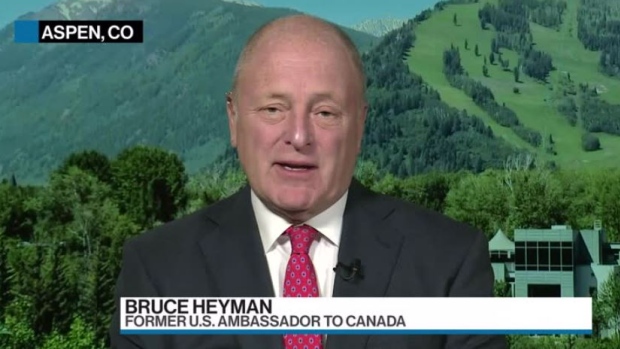Aug 28, 2018
Trump going 'bonkers' on Canadian trade would hurt U.S.: Heyman

If U.S. President Donald Trump becomes “hostile” against Canada as the country seeks a trade deal with its North American counterparts, the economies on both sides of the border would suffer, according to Bruce Heyman, the former U.S. ambassador to Canada.
In an interview with BNN Bloomberg, Heyman said there are three possible outcomes as Canada rejoins North American Free Trade Agreement talks. The first is that an agreement in principle is made by the end of the week, he said. Another is the countries declare they’ve made progress and continue negotiations.
The third outcome is that Trump “goes completely bonkers and hostile and [introduces] auto tariffs, rips up NAFTA and does all the things he’s been threatening,” Heyman said.
“I would say that would be not only very, very bad for the Canadian economy, but that would also be bad for the U.S. economy. It would be bad for the [U.S.] mid-west – the heartland that the president is dependent on.”
- Trump says he'll end NAFTA after reaching new deal with Mexico
- 'Who cares what it’s called?': Wall urges Canada forward on NAFTA
RELATED
Heyman served as ambassador to Canada from March 2014 to January 2017.
Trump said Monday the U.S. is signing a new trade accord with Mexico to replace the decades-old NAFTA pact and called on Canada to join the deal soon or risk being left out. Canadian Foreign Minister Chrystia Freeland left a trip in Europe early to travel to Washington for trade talks Tuesday.
WEIGH IN
Do you support the feds’ view that no deal is better than a bad NAFTA deal?
With the U.S. holding its mid-term elections on Nov. 6, Heyman said the likelihood of Trump’s trade threats toward Canada becoming reality is slim. He added that Trump wants to claim a “real victory” of Canada, Mexico and the U.S. coming together with a trade deal in principle as the U.S. heads into the election.
Heyman also brushed off concerns that Canada may find itself in a weak position in this week’s trade talks with the U.S. given it has recently been left on the sidelines.
“I think we have a unique opportunity to maybe bring this into some type of conclusion or into the final phase of NAFTA negotiations,” Heyman said.
“Think of three people playing a game of cards. Two of them all of a sudden start laying a bunch of cards down on a table, and the third partner may not be doing that and they’re seeing all the cards laid down in trade negotiations, which gives you a lot of advantages going into these discussions,” Heyman added.
“Don’t underestimate the opportunity.”


